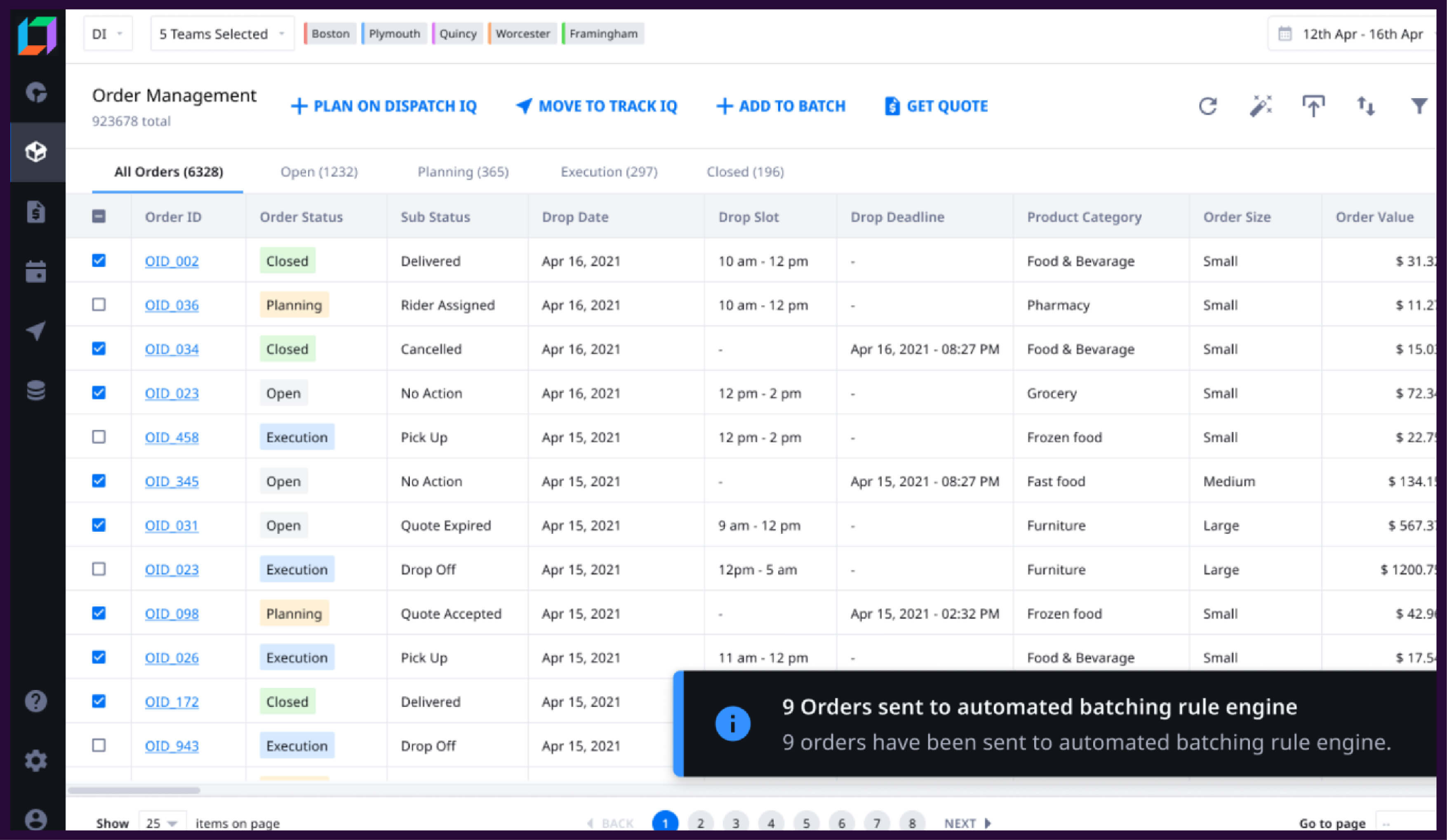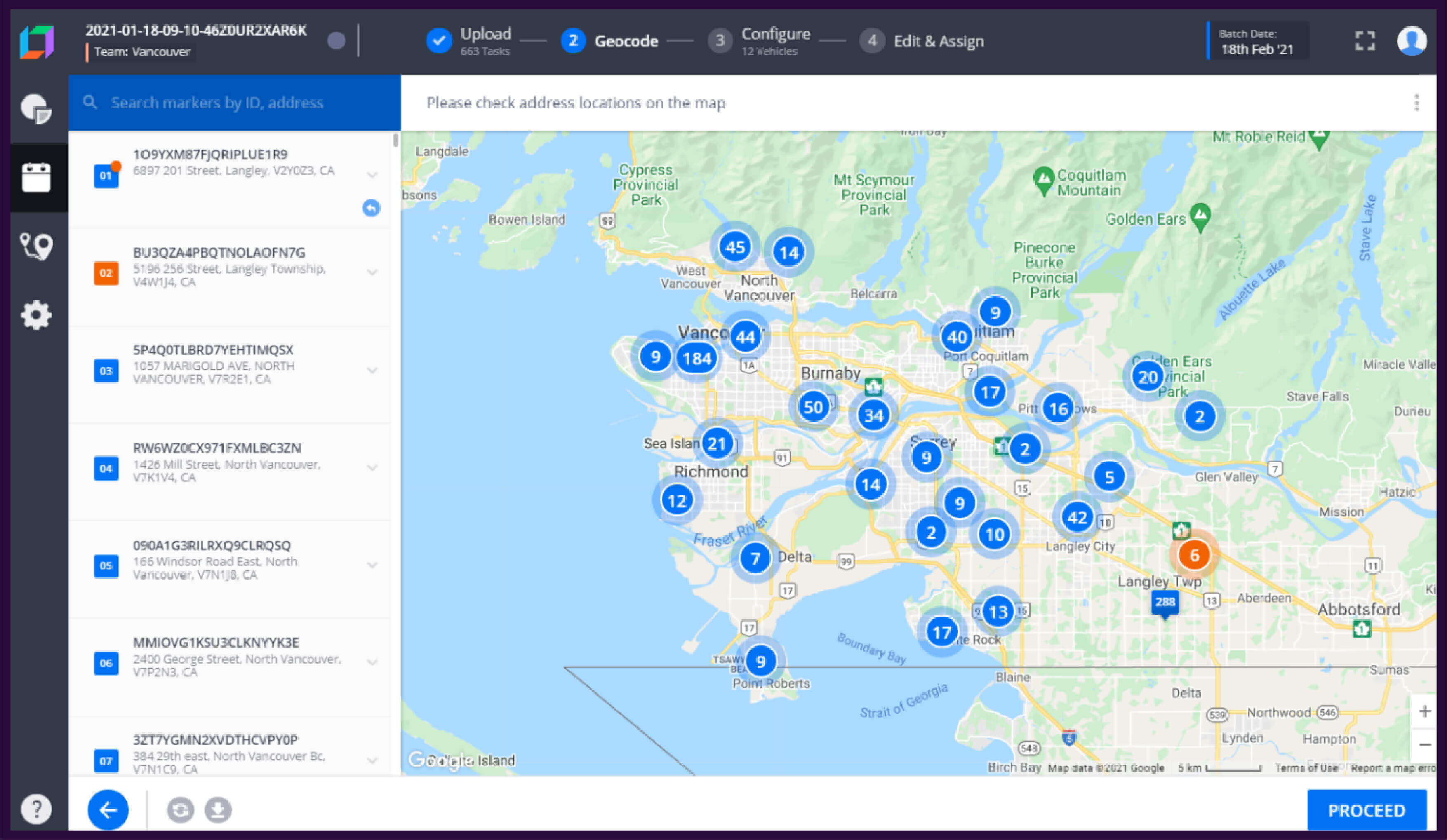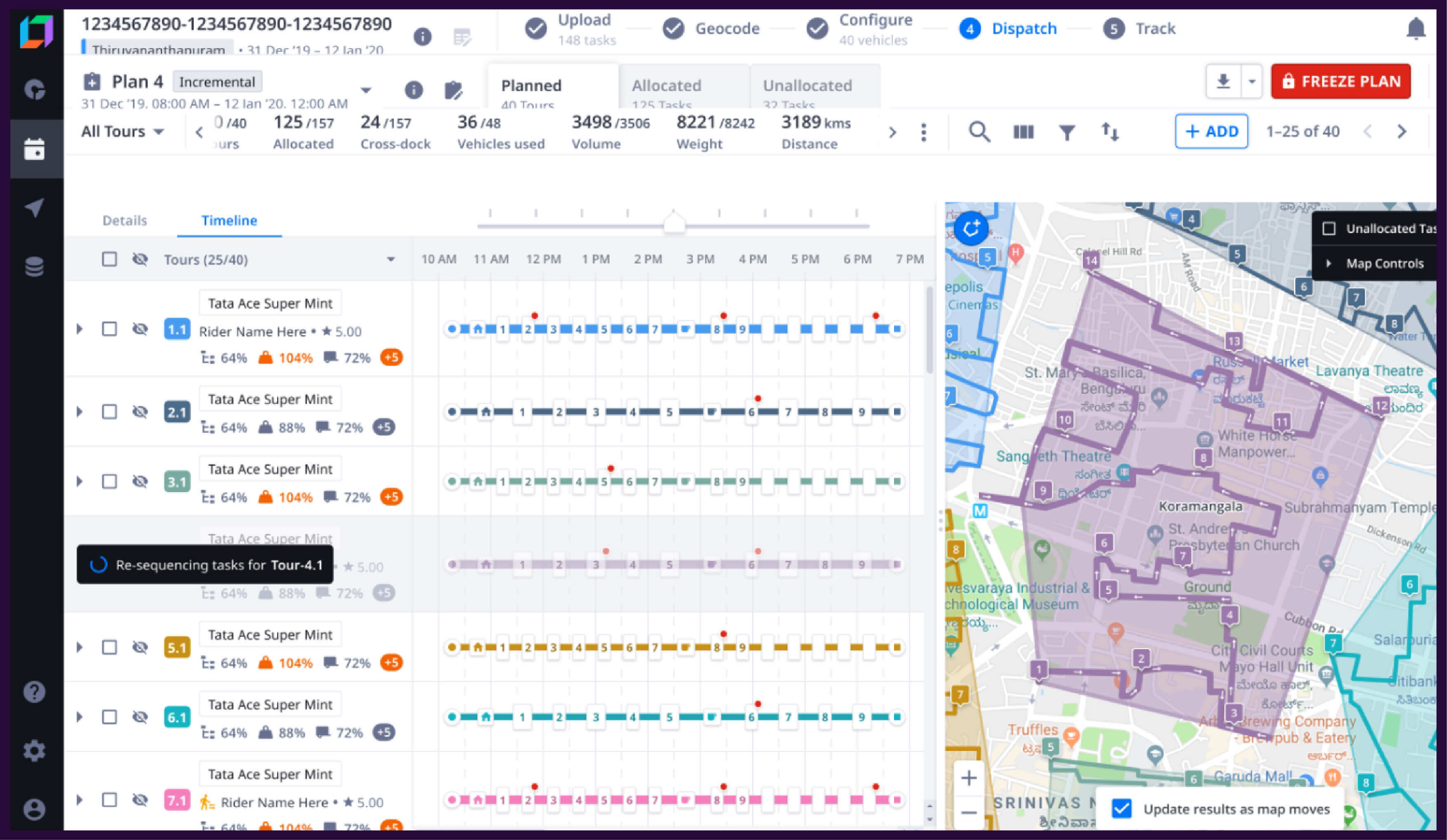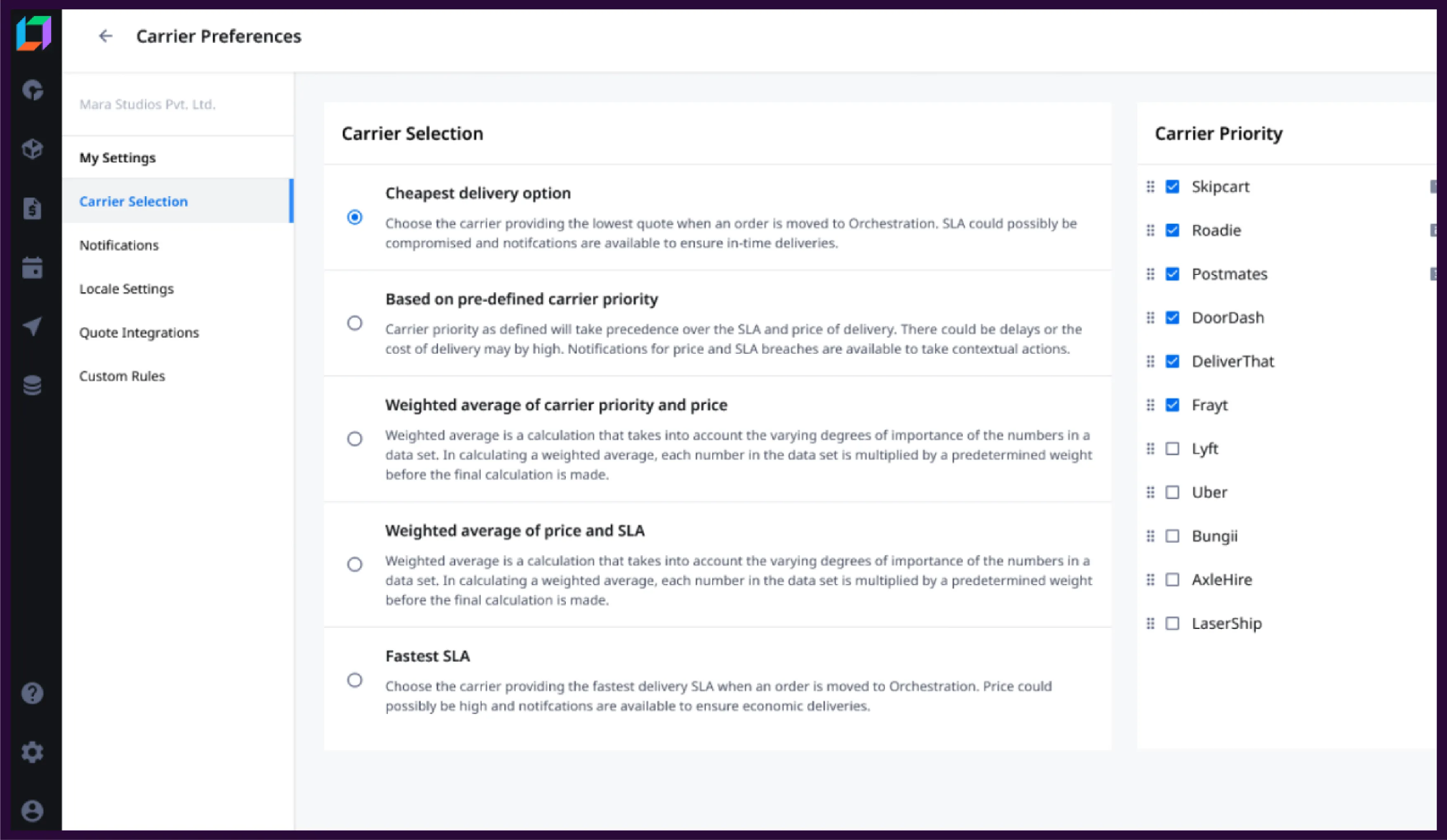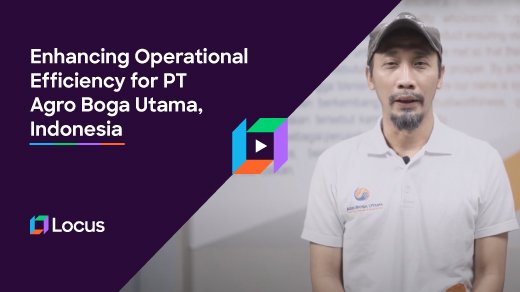Unlock efficiency at scale with route optimization software
25%
Increase in efficiency and productivity
45%
Increase in order deliveries
8%
Increase in SLA compliance
Across 650M+ orders in 400+ cities
Key features of our route optimization software
Turn every mile into a revenue generator with Locus’ route optimization software.
Autonomous vs Supervised Route Optimization
- Automate delivery planning with Locus route optimization software to cut manual errors and accelerate on-time performance.
- Scale logistics faster by minimizing human dependency through AI-powered route optimization software.
- Eliminate planning delays by triggering autonomous routing for high-volume deliveries.
Intelligent Clubbing of Orders
- Boost fleet productivity with Locus route optimization software by grouping orders intelligently for higher delivery density.
- Cut costs by synchronizing compatible orders into optimized delivery routes.
- Improve customer satisfaction by ensuring priority orders arrive on time.
Proprietary Geocoding Engine
- Guarantee accurate deliveries by converting ambiguous addresses into precise coordinates with Locus route optimization software.
- Reduce failed deliveries by validating and correcting customer locations instantly.
- Improve on-time delivery rates with accurate geocoding that eliminates address errors.
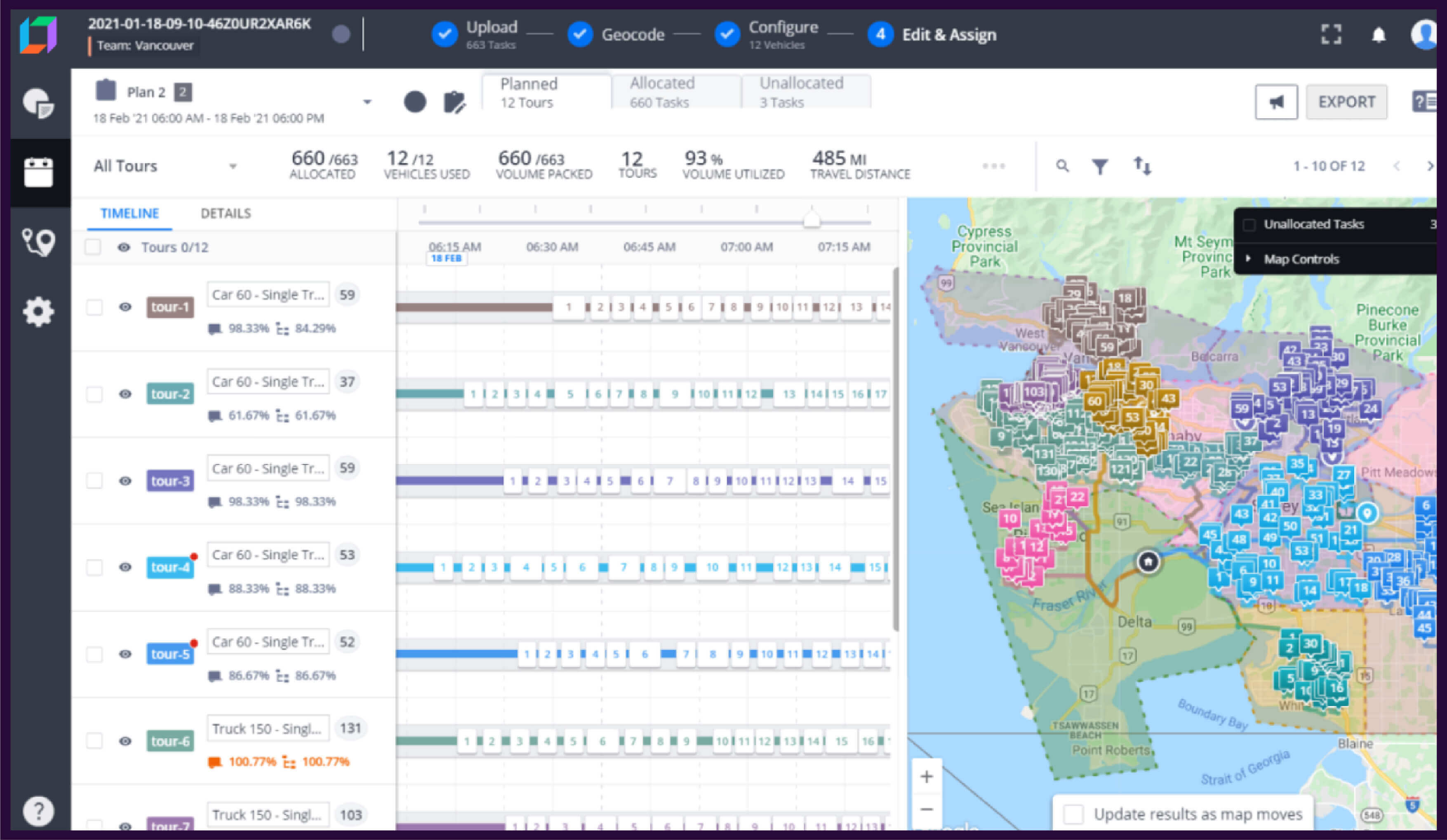
Scheduled + On-Demand Dispatch Planning
- Increase fleet utilization by aligning scheduled and on-demand orders with Locus route optimization software.
- Respond instantly to spikes or cancellations with dynamic rerouting for uninterrupted deliveries.
- Capture more revenue per mile by handling recurring and urgent orders in one system.
Proprietary Vehicle Allocation Engine
- Cut fuel waste by assigning the right vehicle for every route with Locus route optimization software.
- Maximize fleet capacity by calibrating allocation based on traffic, shipment volume, and delivery times.
- Shorten delivery turnaround with automated vehicle recommendations that neutralize inefficiencies.
4 Easy steps to manage and automate your deliveries with Locus’ Route Optimization Software
-
Create batch
Use Locus route optimization software to create delivery batches automatically with RESTful APIs.
- Factor in customer-preferred delivery slots
- Include vehicle requirements and delivery instructions
- Push orders directly to dispatch systems
-
Geocode
Use Locus route optimization software to geocode addresses for accurate routing.
- Decode incomplete or ambiguous addresses
- Convert entries into precise geographic coordinates
- Ensure consistent mapping across regions
-
Configure
Configure vehicles and drivers with Locus route planning software.
- Allocate tasks by distance traveled or workload
- Account for rider breaks and fuel stops
- Set operating hours and compliance rules
-
Plan
Plan dispatch operations with Locus route optimization software using multi-stop route planning.
- Organize daily schedules and routing sequences
- Prioritize orders by delivery requirements
- Optimize stop-level routing for accuracy
See how locus can help to manage your all-mile
Signs that you need Locus’ delivery route planner to optimize your delivery operations
-
You’re a growing business which aims to keep up with the dynamic customer demands of fast and timely deliveries with a smart routing software
-
You’re spending hours on day-to-day logistics planning and wish to have an automated and streamlined dispatch management software in place for more speed and accuracy
-
You easily cater to more than a handful customer addresses or destinations in a day
-
You wish to achieve near 100% compliance on service level agreements with fastest optimal delivery route planning
-
You find it difficult to plan and accommodate immediate changes in schedules for on-demand deliveries
-
It takes a lot of time and efforts to explain delivery schedules and routes to your on-ground staff and riders on a daily basis
-
You wish to eliminate inefficiencies in your current route planning capabilities and optimize it to achieve cost and time effectiveness
-
You want to be on top of your logistics operations with efficient planning, clear communication, and real-time ground visibility
How Locus’ Route Optimization Software Streamlines Delivery Operations
Locus route optimization software simplifies complex delivery workflows by combining automation, AI, and real-time visibility. The platform helps enterprises cut inefficiencies, reduce costs, and scale delivery operations with ease.
-
Automated Dispatching
-
Locus route optimization software automates delivery assignment by factoring in service zones, capacity, and delivery time windows. This reduces manual decision-making and ensures every order is routed to the right driver or vehicle with accuracy.
-
Dynamic Rerouting
-
When disruptions occur, traffic, last-minute cancellations, or urgent orders, Locus dynamically recalibrates routes. The software prevents delays, helps fleets stay on schedule, and maintains SLA compliance in unpredictable conditions.
-
Fleet Visibility
-
With real-time visibility, enterprises can track vehicles, drivers, and orders on one platform. Locus route optimization software provides actionable insights into performance, utilization, and compliance to improve control over day-to-day delivery operations.
-
Smart Resource Allocation
-
The platform intelligently assigns drivers and vehicles based on load type, delivery priority, and capacity utilization. By using AI-driven allocation, businesses improve fleet productivity and avoid underutilization or excess mileage.
-
Integrated Control
-
Locus route optimization software connects seamlessly with ERP, WMS, and TMS systems. This integration eliminates silos, synchronizes logistics workflows, and ensures data consistency across the supply chain.
A word from our customers
Frequently Asked Questions
Routing software is a digital solution that optimizes delivery routes, helping businesses plan the most efficient paths for their drivers to follow when making multiple deliveries or service stops.
Route planning software uses algorithms to analyze multiple factors like delivery locations, traffic conditions, vehicle capacity, and time windows to automatically generate the most efficient routes for drivers.
Key features to look for include real-time tracking, multi-stop optimization, driver app integration, API capabilities, scalability, customer notifications, and comprehensive analytics and reporting tools.
Route scheduling is the process of planning and organizing delivery routes by assigning specific time slots, sequences, and drivers to ensure efficient and timely completion of deliveries.
To map routes with multiple stops, use route optimization software that allows you to input all delivery addresses, set priorities and time windows, then automatically generates the most efficient sequence.
Route optimization is important because it reduces fuel costs, saves time, improves delivery efficiency, enhances customer satisfaction, reduces vehicle wear, and increases the number of deliveries completed per day.
Basic routing techniques include shortest path algorithms, nearest neighbor method, cluster-first route-second approach, and sweep algorithms, each designed to minimize distance or time.
Yes, Locus provides a dedicated driver app that offers turn-by-turn navigation, real-time route updates, proof of delivery features, and seamless communication with dispatchers.
Common routing algorithms include Dijkstra's algorithm, genetic algorithms, ant colony optimization, simulated annealing, and machine learning-based algorithms for complex route optimization.
Optimal routes are determined by analyzing factors like distance, traffic patterns, delivery time windows, vehicle capacity, driver schedules, and customer priorities using advanced algorithms.
Locus route planning software tracks actual routes driven, provides fuel consumption analytics, compares planned vs actual routes, and helps identify opportunities to reduce fuel usage through better route optimization.
Yes, Locus provides driver performance analytics, identifies training opportunities through route adherence data, and helps managers coach drivers on efficient driving practices.
Yes, Locus LOTR (Locus On The Road) app supports integration with existing telematics solutions through APIs, allowing seamless data exchange and unified fleet management.
Yes, Locus Geocoding Solutions can be used independently as a standalone service for address standardization, validation, and geocoding without requiring the full route planning platform.
Yes, the Locus LOTR (Locus On The Road) app is available for both Android and iOS devices, ensuring all drivers can access the platform regardless of their device preference.
No, the Locus app works offline and stores data locally. When internet connection is restored, all data automatically syncs with the server, ensuring no information is lost.
Yes, the LOTR app includes speed monitoring features that track driver speeds, send alerts for speeding violations, and provide reports to help manage and control vehicle speeding.
Yes, Locus offers a trial version of their route planning and scheduling software, allowing businesses to test the features and evaluate the benefits before committing to a subscription.
Yes, Locus route planning software is versatile and can optimize routes for various use cases including deliveries, pickups, sales calls, service appointments, and field service operations.
Locus offers flexible pricing options including seasonal plans, allowing businesses to pay only for the months they actively use the service, making it cost-effective for seasonal operations.
The number of routes you can optimize depends on your subscription plan. Locus offers various plans with different route optimization limits to suit businesses of all sizes.
Yes, Locus routing software includes automated customer notification features that send alerts via SMS or app notifications when drivers are approaching the delivery location.
Locus employs enterprise-grade security measures including data encryption, secure cloud infrastructure, regular security audits, and compliance with data protection regulations to ensure your data safety.
Yes, Locus supports route planning using exact geo-coordinates. You can upload coordinates via CSV/Excel files or enter them directly through the interface for precise location-based optimization.
Yes, Locus allows you to set driver working hour constraints, ensuring routes are planned within specified time limits and comply with labor regulations and driver availability.
Yes, Locus route optimization considers multiple constraints including vehicle weight capacity, volume capacity, and other custom constraints to ensure routes respect all operational limitations.
Locus supports various routing constraints including time windows, vehicle capacity, driver skills, vehicle types, road restrictions, customer preferences, and custom business rules.
Yes, Locus route optimization software works globally across different geographies, with support for local mapping data, traffic patterns, and region-specific routing requirements.
Yes, Locus is GDPR compliant and follows all required data protection regulations, ensuring proper handling, storage, and processing of personal data according to European standards.
Yes, Locus allows manual route adjustments after optimization. You can drag-and-drop stops, reassign deliveries to different drivers, and make real-time changes as needed.
Industries that benefit from Locus include e-commerce, retail, logistics, food delivery, field services, healthcare, utilities, and any business with delivery or field service operations.
Locus is a specialized route optimization platform that can complement or integrate with existing TMS systems. While it has some TMS features, it's primarily focused on advanced route planning and optimization.
Route optimization software addresses problems like high fuel costs, inefficient routes, late deliveries, poor resource utilization, lack of visibility, manual planning errors, and customer dissatisfaction.



